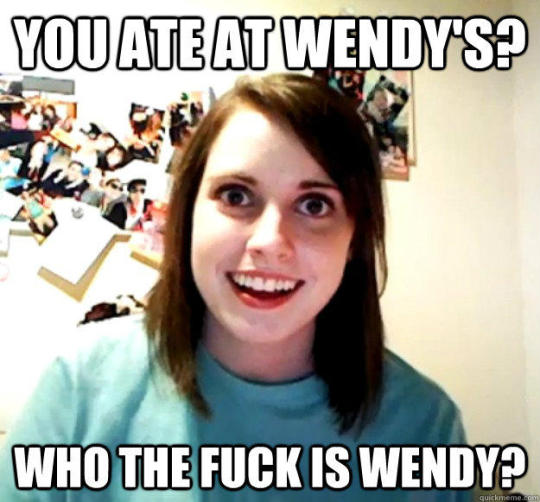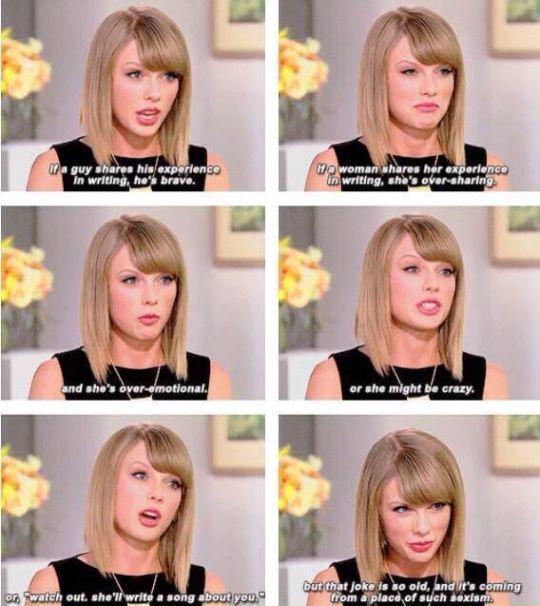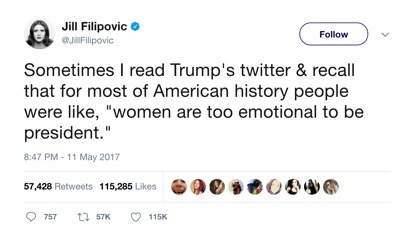#crazy ex

In 2012, while trolls virtually punched feminist blogger Anita Sarkeesian till she bled, and parenting website Netmums declared feminism to be dead, the internet gave women another unwanted present: the overly attached girlfriend meme.
If you haven’t seen it, you haven’t missed much, but for the sake of clarity the meme gained traction for its apparently highly relatable depiction of a clingy, stalker, why-you-so-obsessed-wit-me girlfriend.

Remember when memes looked like this? We’ve come a long way.
The thing that made this meme so successful, was that it captured a message we are told so often it has become a cultural truism: women are crazy.
For most people, expressions like “she’s crazy”, “she’s overreacting”, “she’s being hysterical” wouldn’t seem obviously harmful. They can appear particularly forgivable in the high intensity climate of a relationship breakdown when the “crazy ex girlfriend” tag is often thrown around.
But telling someone that their feelings are irrational, fictional or exaggerated is a form of gaslighting.
Gaslighting is a term for a type of psychological abuse where false claims are made to the victim, making them doubt their own memory, perception of events, and very often their sanity. The term takes its name from the 1938 play Gas Light, where a husband attempts to convince his wife and others that she is insane by manipulating small elements of their environment and insisting that she is mistaken, remembering things incorrectly, or delusional when she points out these changes.
Gaslighting often plays out in gendered ways. Saying that women are ‘overreacting’ or ‘crazy’ when they speak tells them that their emotions are not worthy, legitimate or rational.
Furthermore, when men dismiss their ex partners in this way, they abdicate responsibility to reflect on their role in actually creating these emotional responses.
Most people who use the word “crazy” to describe women probably don’t do so with the express intention of causing harm. In fact, the normalization of this behaviour is pretty unsurprising in light of the many messages we are bombarded with that say this behaviour is okay. We are warned to stay away from the “batshit crazy” girls, but told that sex with those same women is the best you can have. We laugh at charts mapping the “Crazy/Hot” scale on How I Met Your Mother; and the “hysterical woman” trope has been reproduced again and again across the entire era of filmic history. When people are pressed for the details behind the breakdown of their intimate relationships, they offer “she went bonkers” as an easy alternative to the real, complicated and often painful reasons for why a relationship ended.
One of the reasons men call the women in their lives crazy is to offload their emotional labour. Emotional labour includes talking through feelings and working through interpersonal issues and is often seen as “women’s work”, despite the fact that it is vital for the sustenance and health of all relationships. Traditional notions of masculinity teach men to disconnect from their feelings, or at the very least that talking about them is a show of weakness, so it is unsurprising that when faced with emotionally-charged interactions with women the default response is to call mad and mentally check out of the situation. But calling a woman ‘crazy’ because you don’t have the emotional literacy to engage with her needs does nothing but place an unfair burden on her to justify feelings that don’t need a justification.
Dismissing your ex partner as crazy also obscures the legitimate reasons for why they feel the way they feel. A recent thread on Reddit gave women who’ve been called “crazy girlfriends” a chance to tell their side of the story. The answers show how frequently irrational it is to call these women ‘crazy’ when really, their male partners have been instrumental in creating the problem. Here are three examples:
“My mum died. You broke up with me at her funeral. I feel like I was a tiny bit justified.”
“My ex strangled me so I broke up with him. Months later I saw him at the mall with his new girlfriend, a spitting image of myself. I walked up, introduced myself, told her he strangled me and to watch out for his telltale emotionally abusive signs and then poured my full cup of Dr. Pepper on him. Lol.”
“In October of last year I had a miscarriage. I cried for the first two nights and on the third one my boyfriend said it was time to start getting over it. Here I am thinking we’re in the same boat and seeing him as my strength, to only hear him say ‘Get over it.’ Gawd, it destroyed me. He said it was because he didn’t want to face it and seeing me like that was a constant reminder but I truly lost so much respect for him after that."
But call them crazy.

Artwork at @marcela.draws
It’s not just partners and ex partners that’s the issue – calling anyone ‘crazy’ is problematic.
Another disturbing aspect of this narrative is how it contributes to the ongoing stigmatization of mental illness. As we’ve discussed, using language in this way feeds a culture that works to prevent people from having constructive emotional interactions during the breakdown of relationships. But the suggestion that people living with a mental illness deserve to be met with contempt and dismissal is also deeply troubling.
Using the word crazy as a slur is hurtful and minimizing. Neuro-divergent people have a hard enough time having their experiences of issues like anxiety, depression and bipolar recognised, validated and cared for. So when you say “fuck my ex, she crazy”, you are inadvertently contributing to a world that says people who are ‘crazy’ are not worth anyone’s time.
The problem is also gendered – women are called ‘crazy’ more than men, even when the emotions and behaviour are exactly the same.
What that means is that sexism plays a crucial role in this phenomena.
Something tells us that if a woman were to release an hour long musical plea for the love of an ex-partner it would go straight in the crazy box, but somehow Robin Thicke can do it and the world cries “passionate”, “tortuous” and “brazen” – but not crazy. By contrast, when a woman turns her break-up pain and emotional experiences into art, she’s a pscyho.

The ‘crazy’ slur is heard not just in relationship breakdowns but at a broader societal level too.
Labeling women in these ways does not absolve the accuser of their duty to take control of their emotional responsibilities, and it does a great injustice to our societal progress. How are women to be taken seriously when the current President of the United States Donald Trump can say that the former Democratic nominee Hillary Clinton “could actually be crazy” for doing her job to a crowd of 5,000 people? If women are to reach our full potential our legitimate contributions at home, work and in society must stop being met with questions about our sanity.

When you get the urge to call a woman crazy, take a moment to think about what that might be saying about you. Instead of alienating her, try instead to engage with her about the emotions she is expressing. When you do that, you are extending an olive branch that shows her you care enough to understand where she is coming from - and you might find that, in the end, her behaviour isn’t so surprising after all.
Read next: “8 ‘Compliments’ That Perpetuate Size-Shaming” >>>

